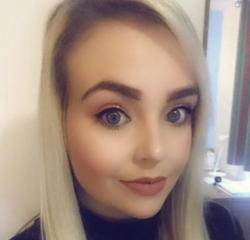
For Healthcare Science Week, Ms Charlotte Hainsworth, Specialist Cardiac Physiologist at Bradford Teaching Hospitals NHS Foundation Trust, shares her journey into echocardiography and through British Society of Echocardiography (BSE) accreditation.
Healthcare scientists are the backbone of NHS diagnostic testing. Although we make up just 5% of the workforce, we are involved in approximately 80% of diagnoses.
Of the many disciplines within healthcare science, some people work very much behind the scenes, but cardiac scientists are predominantly patient facing, performing diagnostic tests and assisting with interventional procedures. I learnt of the role of a cardiac scientist whilst studying for my Bachelor’s degree in Sport and Exercise Science and I knew then it would be the perfect career path for me because I have always enjoyed learning about cardiovascular physiology.
I used echocardiography in my undergraduate dissertation and later acquired some practical echocardiography experience as part of my Master’s degree in Clinical Exercise Physiology. This was just scratching the surface, but I was fascinated by ‘echo’ and this hasn’t really changed. I think it is quite natural for cardiac scientists with a sports science background to choose to specialise in echocardiography. We already know about the structure and function of the normal heart, and training in echocardiography, you apply this knowledge to consider the appearance of each structure on ultrasound and identify abnormalities. I love the combination of scientific skills and continuous learning as technology and research develops, whilst also knowing I can make a difference to patients.
I have just achieved BSE transthoracic echocardiography accreditation, which is a nationally (and internationally) recognised qualification. It was developed to ensure that a patient can have an echocardiogram at any hospital in the UK and the same standards will be met. The accreditation process usually takes about two years. I started working towards my accreditation during the coronavirus pandemic, which brought a number of challenges due to the postponement of all routine outpatient tests and, following recommencement, the fact that a second member of staff wasn’t allowed in clinic rooms due to social distancing, which hindered my training. However, there were some advantages of going through the process during the pandemic too. The first part of the accreditation process is a written examination with a large syllabus covering all underpinning knowledge required to perform, interpret and report echocardiograms. I found that restrictions in place allowed me to allocate more time to revise for this exam, which I passed first time in October 2020.
The next stage of the accreditation process was to collect a logbook of 250 echocardiograms I’d performed and reported. There is a minimum number of cases required for each abnormality echocardiography is used to assess. As a result of the backlog from cancellations, most patients coming for an echocardiogram had a known abnormality, which enabled me to collect sufficient cases of each abnormality in a little over a year.
The final stage of the accreditation process is to attend a practical assessment. This is made up of three sections: feedback on the logbook, undertaking a practical scan on a volunteer with no abnormalities and presenting five video case studies, which is the most difficult part. The video cases must include one normal, three specified pathologies and one ‘other’, taken from a choice of a number of pathologies. You need to choose patients who are good imaging subjects and who each ideally only have one pathology, which sounds easier than it is! The cases are reviewed in great depth and I was asked numerous questions to check my understanding and justify my decision making. This is the section most candidates perform least well on, but to my relief, I had passed all three sections.
I was the first person from my trust to go through the accreditation process since 2017. This meant there was no one in my department with recent experience to ask questions. However, I found the BSE website has some excellent resources. The accreditation pack was the main source of information and I found this really useful in understanding the standard expected for logbook reports and video cases, as marking criteria are included. I also watched the ‘information for mentors’ video and attended a webinar with the chair of accreditation about how to be successful at BSE accreditation. So there are resources available for candidates from trusts that don’t regularly have people going through the process. Furthermore, there is a really good community on Twitter and people were really kind, sharing their experiences, giving me advice and support.
I am now looking forward to further developing my career in cardiac science. I believe I have overcome the biggest hurdle by achieving BSE accreditation, but I still have a lot to learn. Healthcare science is rapidly evolving with a lot of emphasis on developing scientist led services. This involves healthcare scientists taking on more responsibility for their own patients, which also means being able to make more of a difference to patients, whilst relieving pressure on consultants, thereby helping to reduce waiting times. I am now getting involved in service development within my department and regularly present at monthly echo meetings, as well as helping the BSE by reviewing proposed changes to their accreditation requirements and resources. I hope to utilise these skills to achieve equivalence with the Academy for Healthcare Science and become a Clinical Scientist in a few years’ time.